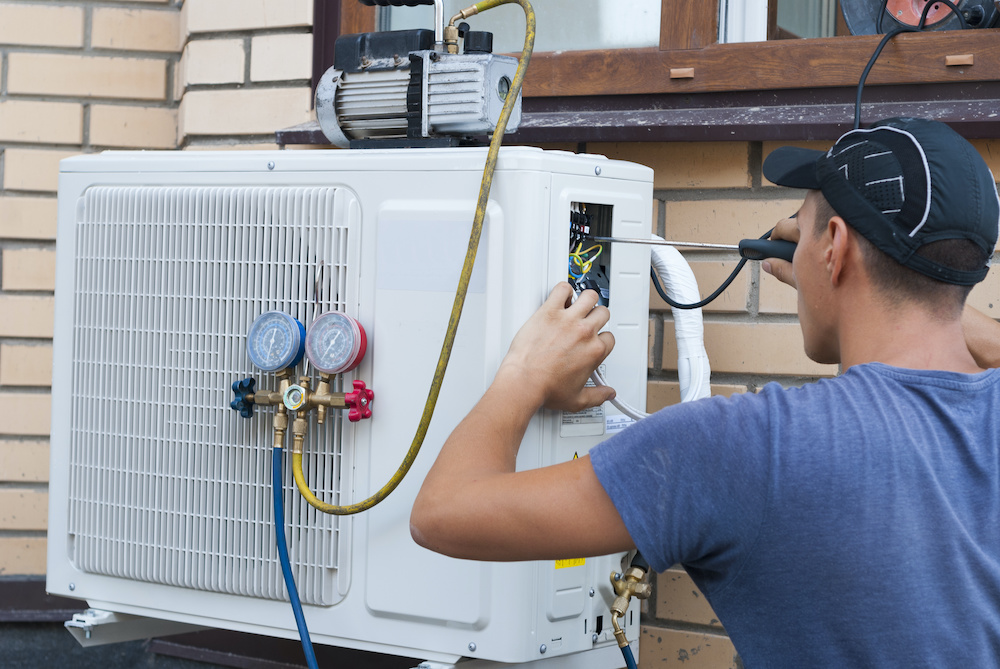An A/C unit that’s starting to break down is never fun for any homeowner. In fact, it’s a nightmare, especially if you’re from the US, where people spend at least USD$100 on average each month for cooling their homes. (1)
Can you imagine sitting inside your house during the summer without the nice reprieve from everyday heat that your air conditioner provides? That’s why you should get your A/C back to its working condition as soon as it starts acting up.
But what should you do? Should you repair your air conditioner with an A/C troubleshooting guide or would buying a new unit be a better idea? It’s often an annoying dilemma for homeowners. Fortunately, here are some signs to help you determine whether your A/C needs repair or replacement:
1. Your air conditioner is already more than ten years old
One significant factor homeowners should consider when repairing or replacing their air conditioning unit is its age. A replacement is probably unnecessary for A/Cs that are only a few years old. That’s because a reasonably new system usually only requires simple, quick fixes.
However, it may not be the case for aging A/C units. Keep in mind, an air conditioner’s lifespan is between 15–20 years, on average. So replacing an A/C with a more efficient version is something that you should consider if the one you got at home has already hit the 15-year mark. (2)
Newer, more efficient units and models can probably save you more money on your energy bills. Despite the upfront costs, upgrading your old air-conditioning unit to a brand-new one may eventually make more sense.

2. Your A/C is still energy-efficient
Mentioned earlier is how energy savings is one of the benefits of replacing your old A/C with a brand-new unit. However, don’t replace your air conditioner immediately without talking to an A/C specialist or observing your energy bills first. Remember, the most efficient air conditioning units can cost at least USD$3,000. (3)
If your energy bills are still manageable or don’t keep going up and your A/C doesn’t keep breaking down, there’s no need to pay for repairs frequently and a replacement may not be necessary—at least for the time being. It’s especially true if your air conditioner is well maintained.
Again, speak with a technician to help you compare your current unit’s seasonal energy efficiency ratio (SEER) with what’s available in the market. (A higher SEER rating means more energy efficiency.) Or you can also do the math yourself using your home’s air-conditioning costs in the last three to five months.

3. Your air conditioning unit requires an additional refrigerant
An air conditioner likely has a coolant leak if it runs out of refrigerant constantly. It’s one of the reasons why A/Cs freeze up.
Older A/C units have what’s known as R-22 refrigerant, also called Freon. The problem with this refrigerant is that it’s already getting phased out in the market, with only reclaimed, recycled, or recovered supplies the only ones left. For that reason, topping your unit with it can now cost anywhere from USD$40 to USD$175 per pound. Add the cost of service, and the repair expenses can reach up to USD$1,000.
Newer air-conditioning models now have R-410a refrigerant, which is more environmentally friendly when compared to R-22. In fact, production of the R-22 refrigerant has already stopped in 2020. So if your A/C takes R-22 and its compressor broke down and the unit developed a leak, it should probably be replaced. After all, the overall repair cost may end up about the same as purchasing a new low-end air conditioner.
4. Your A/C unit’s issue is caused by another part of your HVAC system
Many homeowners like to DIY fix their air conditioners. If they fail to find the root cause of the problem or don’t think they can repair the unit themselves, Most DIYers stop and impulsively buy a new A/C instead. Unfortunately, an air conditioner’s issue sometimes lies not in the unit itself. Other parts of the heating, ventilation, and air conditioning (HVAC) system may have caused it, such as leaky air ducts or broken air pumps.
That’s why you must get your system checked by a professional or a specialist, especially if your knowledge of A/C or HVAC systems is limited. Doing so can save you a significant amount of money from an unnecessary purchase because in cases where another part of your HVAC system caused the problem, a repair would be the best move.

Conclusion
The decision to replace or repair your home’s A/C can be complicated. That’s because every system and each situation is different. Fortunately, there are some things homeowners can do to lessen the chances of making the wrong decision. These include looking at your air conditioner’s age, assessing its energy efficiency, checking its coolant requirement, and having your entire HVAC system inspected for any issues that may be affecting your A/C.
References
1. “Air Conditioning”, Source: https://www.energy.gov/energysaver/home-cooling-systems/air-conditioning
2. “Central Air Conditioning”, Source: https://www.energy.gov/energysaver/central-air-conditioning
3. “How Much Does It Cost To Install Central Air?” Source: https://www.homeadvisor.com/cost/heating-and-cooling/install-an-ac-unit/







